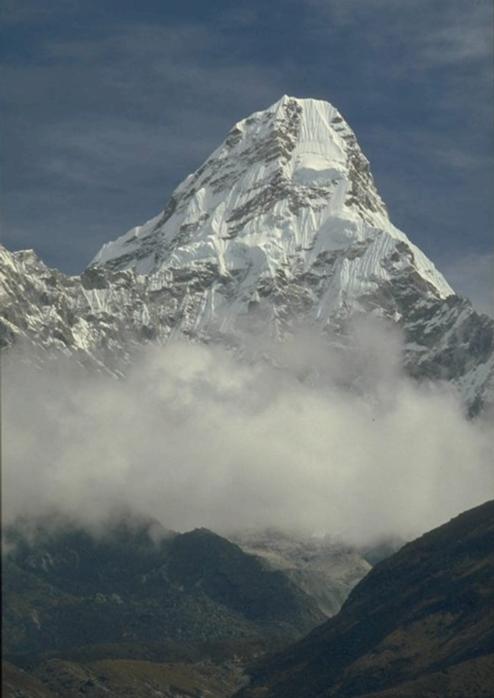
The course will focus on physical, chemical and mechanical processes that shape the earth's surface. We will first build the earth's surface, investigating such processes as plate tectonics, mountain building, volcanism and earthquakes. We will then erode these structures with water, glaciers and wind, to form soils, river valleys, and other landscape features. We will also discuss the importance of natural hazards. Throughout the course we will weave in information on the consequences to the natural environment of our ongoing manipulation of these processes.
The role of water will be a consistent theme througout the class. Additionally, we will talk about avalanches, hydrogeology of beer, and the extinction of dinosaurs. Geography 1011 has no prerequisites. There is a MANDATORY LABORATORY CLASS; all students in Geography 1011 MUST take the lab class.
Exams will cover material from lectures, text, and supplemental readings. Supplemental readings are on reserve at the new Earth Sciences Library. Exams will emphasize lecture material and there will be some questions from the assigned readings that are not covered in lecture. Test questions will be muliple choice, true-false, and matching. There are NO make-up tests for the midterms.
Tests are scantron. Bring a #2 pencil, an eraser, and your student ID number to each test. You do not have to show your student ID. However, you must put your student ID number on the scantron test.
For many of you, this class meets a core scientific requirement and will be the only science class that you take. This class is required for Geography majors. Others are looking for interesting majors. My goals for this class are to:
There are two Internet-Based Laboratory Exercises:
| Midterms | 40% | There will be three midterms. The grade from the lowest midterm will not count. Each of the two remaining midterms will count 20% each. There will be no make-up exams. |
|---|---|---|
| Final | 30% | Two thirds of the final exam will be material covered after the last midterm and one third will be comprehensive. |
| Laboratory | 30% | There may be quizzes during the labs |
The questions and grading are designed so that someone who spends some time reading the textbook and going to lectures can get a C. Most questions simply ask you to repeat material from the textbook and lectures, such as defining definitions. There is a reward structure for students who both study hard and are attentive in class. A small number of harder questions are asked to separate the B's from the C's. A couple of critical thinking questions are asked (where you apply knowledge from the class in a new context) to separate A's from B's.
Tests are qualitative rather than quantitative. There are few equations in this class.
TA's for Labs ( update for this year
If you qualify for testing accommodations because of a disability, please submit to me a letter from Disability Services in a timely manner so that your needs may be addressed. Disability Services determines accommodations based on documented disabilities. (303-492-8671, Willard 322, www.Colorado.EDU/disabilityservices). Similarly, if you have problems with the field portion of the class, please contact me about accomodations unique to your personal situation.
Please notify me of potential conflicts with religious schedules as early in the semester as possible so that there is adequate time to make necessary arrangements.
The University has recently adopted a student Honor Code. Information on the Honor Code can be found at http://www.colorado.edu/policies/honor.html and at http://www.colorado.edu/academics/honorcode/
Date | Topics | Reading |
|---|---|---|
| 8/22 | General Introduction | Syllabus |
| 8/24 | Scientific Method | Chapter 1, pp 6-7 (SciMethod notes) |
| 8/26 | Gaia Hypothesis | Gaia Hypothesis notes |
| 8/29-31 | Earth Structure, Mineralogy and Rocks | Chap 11, 12
Dynamic earth Rocks |
| 9/2 | Plate Tectonics, Orogeny | Chap 11, 12
Plate Tectonics Adina: Orogeny |
| 9/5 | Labor Day | No class |
| 9/7-9/12 | Continuation of rocks, orogeny | Chap 11, 12 |
| 9/14 | MIDTERM I | Readings to date
Tyler Levy notes |
| 9/16-19 | Earthquakes and Vocanoes | Chap 12, pages 375-394
Adina's Earthquake notes Volcano notes |
| 9/21 | return mid1, Dinosaur Extinction | Powerpoint notes |
| 9/23-28 | Weathering, Mass Wasting | Chap 13
Weather ppt notes Additional mass wasting notes |
| 9/30-10/12 | Soils | Ch 18, Ch 9 pages 248-254
Kristina's ppt notes |
| 10/12 | MIDTERM II | Readings to date |
| 10/14 | no class | fall break, have fun |
| 10/17-19 | return mid II, Hydrology I (water resources, water balance) | Chap 9 |
| 10/21-26 | Hydrology II (ground water) | Chap 9 |
| 10/28 | Hydrogeology of Beer | Supplemental Readings |
| 10/31 | Fluvial Processes I (flow and sediment transport) | Chap 14 |
| 11/2 | Fluvial Processes II (floodplains, sediment yield) | Chap 14 |
| 11/2-7 | Snow | Chap 17
Snow overview notes Mtn Hydrology powerpoint on 2 November |
| 11/9 | MIDTERM III | Readings to date |
| 11/11-14 | return mid III, Intro to Ice and Snow | Chap 17
Snow overview notes |
| 11/16-18 | Avalanches | Avalanche powerpoint |
| 11/21-23 | Snow |
Mountain snowpack Snow metamorphism |
| 11/28-Dec 2 | Glaciers | Chap 17 Glaciers Glaciers and climate Glacial landforms |
| Dec 5 | Acid mine drainage: Summitville Mine Disaster | Supplemental Notes |
| 12/7 | summary, catch-up | In class Review |
| 12/10 | Final | 1:30 pm to 4:00 pm |